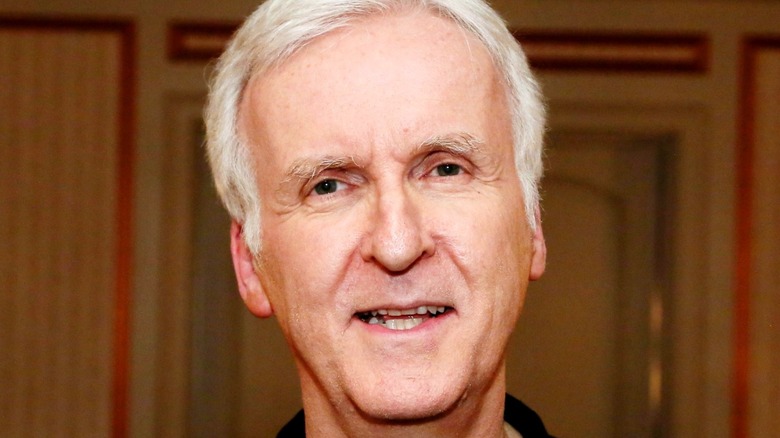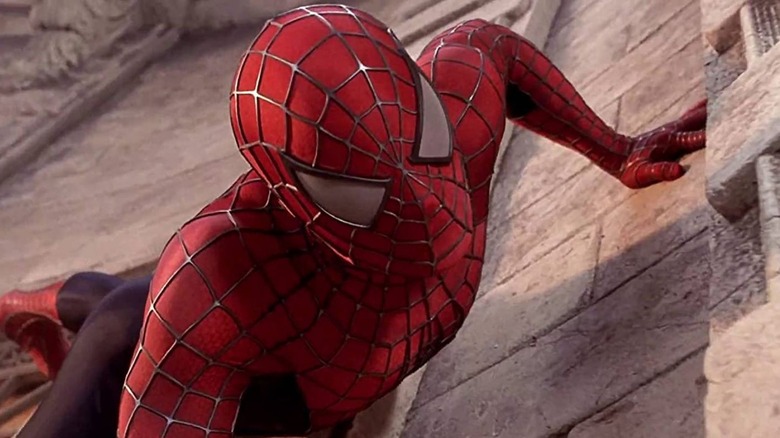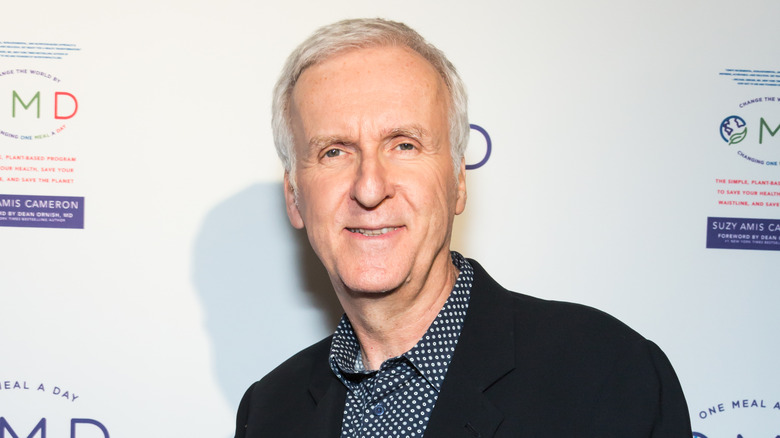James Cameron Finally Opened Up About His Failed Spider-Man Movie
Since "The Terminator" was released in 1984, filmmaker James Cameron's name has become synonymous with the word "blockbuster." In the ensuing years, he's directed several global smashes, from "Aliens" to "Terminator 2: Judgment Day" to "True Lies" — and, of course, both "Titanic" and "Avatar" went on to become the highest grossing films worldwide of all-time. Currently, according to Box Office Mojo, "Avatar" is No. 1 with $2.84 billion in ticket sales, while "Titanic" is No. 3 with $2.2 billion at the global box office.
The No. 2 leader in global box office revenue is "Avengers: Endgame," which currently has a worldwide take of $2.79 billion. And the irony with "Avengers: Endgame" is that one of the principal characters in the Marvel Cinematic Universe superhero extravaganza, Peter Parker aka Spider-Man (Tom Holland), is also a character whose tale Cameron hoped to adapt for the big screen in the 1990s. This ended up not happening, since Carolco Pictures — the "Terminator 2" production company meant to financially back Cameron's Spider-Man movie – went bankrupt and he couldn't find another backer, so the filmmaker's plans to adapt the webslinger's tale for the big screen never materialized.
While plans for a "Spider-Man" movie eventually landed with "Evil Dead" trilogy filmmaker Sam Raimi at Sony Pictures, Cameron still laments the opportunity he missed, decades ago. In his new book, "Tech Noir: The Art of James Cameron," the filmmaker calls his unrealized version of the famed Marvel superhero "the greatest movie I never made," and he's finally spilling some details about his take on the Spidey tale.
Spider-Man is actually the tale of 'Spider-Kid,' James Cameron says
While discussing his new book in a virtual roundtable session with journalists (via ScreenCrush), James Cameron discussed how Peter Parker's growth from boy to man was key to his understanding of the character. "The first thing you've got to get your mind around, is it's not Spider-Man. He goes by Spider-Man, but he's not Spider-Man. He's Spider-Kid. He's Spider-High-School-Kid. He's kind of geeky and nobody notices him and he's socially unpopular and all that stuff."
As such, Cameron said at the roundtable, the superhero tale was an "untapped reservoir of potential that people have that they don't recognize in themselves. And it was also in my mind a metaphor for puberty and all the changes to your body, your anxieties about society, about society's expectations, your relationships with your gender of choice that you're attracted to, all those things."
Of course, one of the biggest changes featured in Raimi's 2002 "Spider-Man" film was that Parker had organic web shooting capabilities — a decidedly different take on the web shooting technology in the comic books created by writer Stan Lee and artist Steve Ditko. However, it was actually Cameron who came up with the idea with the organic web shooters, and he went so far as to get a blessing from Lee to implement it. "Going with the biological web shooters as being part of his biological adaptation to the radioactive spider bite made sense to me," Cameron said in the ScreenCrush article.
James Cameron says his Spider-Man movie would have had a real-world feel
Superhero movies have no doubt evolved since Sam Raimi released "Spider-Man" in 2002, and while that film employed a stylized, comic-booky approach to the genre, in keeping with Raimi's trademark style, Cameron's take would've probably been more similar to Christopher Nolan's "Dark Knight" trilogy, or the original 2000 "X-Men" movie by Bryan Singer, in regard to realism. "I wanted to make something that had a kind of gritty reality to it. Superheroes in general always came off as kind of fanciful to me, and I wanted to do something that would have been more in the vein of 'Terminator' and 'Aliens,' that you buy into the reality right away," Cameron explained at the roundtable. "So, you're in a real world, you're not in some mythical Gotham City. Or Superman and the Daily Planet and all that sort of thing, where it always felt very kind of metaphorical and fairytale-like."
Ultimately, Cameron said, he wanted to present Spider-Man in more of a relatable, universal sort of way.
"I wanted it to be: It's New York. It's now," Cameron said, per ScreenCrush. "A guy gets bitten by a spider. He turns into this kid with these powers, and he has this fantasy of being Spider-Man, and he makes this suit and it's terrible, and then he has to improve the suit, and his big problem is the damn suit. Things like that. I wanted to ground it in reality and ground it in universal human experience. I think it would have been a fun film to make."
Apart from his new book, Cameron is working on his four "Avatar" sequels, the first of which is slated for a December 16, 2022, release.


